Joel S. sent in a link to an article by Gonzalo Frasca at Serious Game Source about a management simulation game the U.K. branch of Intel released back in 2004. It was called The Intel IT Manager Game: The Simulation of an IT Department and was a free promotional program:
The player had to hire IT employees, as well as manage a budget and buy computer equipment, the latter of which was either generic or Intel-branded.
When you started out you selected the sex of your IT manager:
But then, when you went to hire employees…they forgot to include an option to hire any women. You could get a guy with a green mohawk, though:
After a few days the game was taken down and Intel said they were making revisions; it re-launched a month later, this time with female employee options, including this one, whose hair looks like alien antennae to me:
You can see the current version here.
Frasca argues that such oversights are more important than the lack of female avatars in some video games:
The Intel game is not merely an entertainment product: it is a piece of corporate advertising that simulated an IT workplace for an audience of real IT workers. Unlike what happens in the fantasy world of Fable, gender inequality is a very real problem for IT workers.
The post mentions the National Center for Women and Information Technology, so I went over and looked at some of their data. Gender of students who take the SAT and say they plan on choosing computer/IT majors:
If anything, it looks like the gender segregation of computer/IT occupations is increasing:
Broken down by gender and race/ethnicity:
Asian/Asian American women are actually overrepresented compared to their percentage of the U.S. population (all Asian Americans make up just about 5% of the entire U.S. population, obviously Asian American women make up less than that, though I don’t recall the exact proportion). All other racial/ethnic groups listed here are significantly underrepresented in computing jobs.
The percent of patents in various fields invented by women in the early ’80s and the early…’00s (?):
Frasca suggests that one reason for the Intel snafu might be a lack of women working on the project — if there were women, they might have noticed the lack of female employee options. That’s possible. It’s also likely that having more women in a workplace makes their male colleagues more aware, and thus a guy might think, “hey, maybe we should add some women employees to the game.”
This is totally anecdotal, I know, but forgive me. I have a number of female friends who work in computing jobs; almost all of them have generally found themselves to be the only, or one of just a few, women in their office. And with few exceptions, they say that the men they work with aren’t openly hostile or unfriendly. They don’t deviously exclude them from projects or social events or make lots of sexist remarks. But they forget they exist (for instance, inviting everyone else in the office to lunch where they talk about new project possibilities, and then seeming genuinely sorry later when they realize they left out the only woman in the office…but doing it again anyway).
And things like the Intel game reflect and reinforce the invisibility of women in such fields.


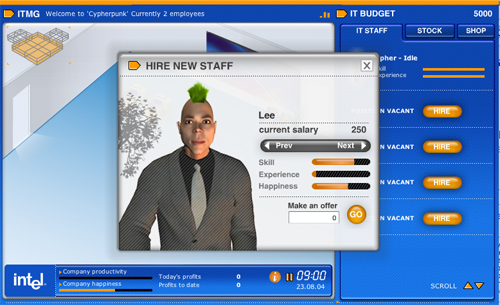

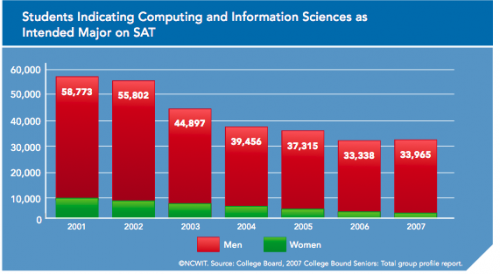
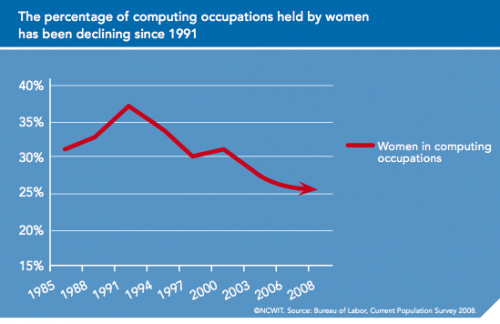
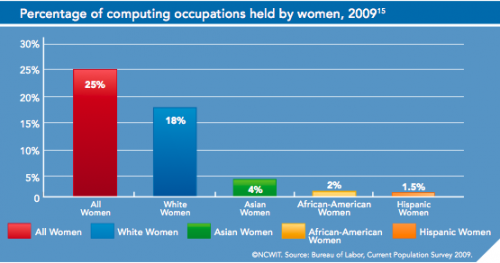
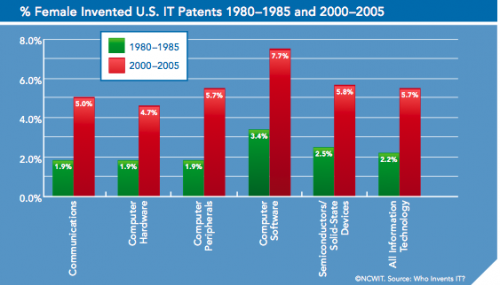
Comments 51
Day — July 17, 2010
I don't know if this is incidental to the particular screenshots, but I noticed that the female employee has tons of experience but moderate/low skill. . . and she's on the grumpy side. Meanwhile, green mohawk man has almost no experience, high skill and medium-high happiness. Hmn. . .
Kelly — July 17, 2010
This makes me think of the idea of a chilly climate. Women can get jobs in IT, and once there no one is openly hostile, but the atmosphere is still uncomfortable for them. They're not included in the all-male social activities or the employees don't realize that the environment can be excluding.
Day — July 17, 2010
As a female IT worker, I love my job and my workplace atmosphere. I find it a lot more hospitable than more traditionally-female industries, like food service and education, where I have worked in the past. I believe the selection process takes place mostly at the level of earlier education. In my experience, many of the (generally male) managers would love to see more female employees and are receptive to suggestions about how to make a more welcoming professional atmosphere.
Jane — July 17, 2010
It's not an oversight. These guys know exactly what they are doing when they exclude women and know how to fake the innocent act afterwards.
C.L. Ward — July 17, 2010
I work in an IT development operation for a government agency. Our team is headed by a woman, has three female developers and two male developers, two female QA, two female business analysts and one male business analyst. We get most of our development staff originally as interns, who develop over time into graduates and come on as full-fledged team members.
I have no data to support this theory, but I suspect that big salary positions with corporations vs. lower paying government jobs that have great job security and benefits may have something do do with the staffing in our office. It would be an interesting comparison to formally study the gender ratios of IT personnel entering government positions vs. those going into corporate environments.
Leslee Beldotti — July 17, 2010
I work for a large video game developer(MMO)in the QA department. I don't have any hard statistics, but I would guess that the percentage of women in the entire company is less than 10%.
Occasionally the guys in my department will exclude me from social activities, but when I point it out to them they immediately try to make amends for it.
I don't think it's intentional. I think it has more to do with the cultural stigma of socializing with the opposite gender when one or both parties is married or committed.
How often have you been to a party of (hetero) married couples where all of the women congregate in one area and all of the men in another area? I think that behavior carriers over into the workplace, as well.
Leslee
anon — July 17, 2010
As a female computer major, I've never had much of a problem with the other students, but a few of my teachers have been kind of patronizing. I had one who was walking around the classroom and helping students. When I had finished writing my program, decided to slowly explain to me how to copy paste and close a window.
reschan — July 18, 2010
My husband works in a software company, and of the 100 people at his workplace, I think there is 1 female programmer? Every other woman he mentions is a designer or a manager or in HR, PR or some sort of administrative role.
c3p — July 18, 2010
i dont get it:
for instance, inviting everyone else in the office to lunch where they talk about new project possibilities, and then seeming genuinely sorry later when they realize they left out the only woman in the office
how do they do it? how can you invite everyone except one person and that not on purpose?
JSX — July 18, 2010
Male coder here. I work in a Silicon Valley software company, and I notice every day how few women there are especially in the more technical/engineering roles. Nobody talks about it much, but it just feels *weird* to be in such an overwhelmingly male work environment, in 2010. I don't know how anybody could *not* notice it.
The head honcho of the whole company is a woman, there are I would guess 20-30% women in management/admin/legal roles, and I think >50% female in marketing and PR. But when it comes to the people who are writing the code, women programmers are so rare as to have nearly mythical status. The stereotype that "women have good social skills, men don't" is often invoked to justify why more women are in management than engineering, but it's not the case that women are the majority or even 50% of management (and why is it OK to stereotype male engineers as dorks with no lives or social skills?).
I interview almost every candidate who applies to work in my department (sometimes other departments as well) and am involved in the hiring decisions. In 2+ years at this company I've only had one or two women apply for regular tech jobs. I've interviewed a greater number of *guys named Dave* than all women put together. In other words, I would love to hire more, but they're just not applying.
I say this not to try to justify the status quo, but rather to theorize that the male-centeredness of the computer industry pervades all levels -- from secondary education, to who is encouraged/discouraged to pursue software as a career, to who can gain enough experience and contacts to apply for better jobs, etc.
What's interesting is that applications for college internships in software engineering, while still majority male, include a much higher percentage of women than do applications for full-time jobs. At least some women are making it through to the college level without getting discouraged from participating in the industry, but what happens to them after that?
I don't know. It's a hard problem. An individual company, no matter how well-meaning, is part of a sexist social system and has little power to change that system solely through their own hiring practices if women aren't applying.
I favor doing more to get girls interested in math and science at a young age. There seems to me to be a pretty clear line of cause and effect between stuff like the pointlessly gendered toys often shown on socimages (like perfume-based chemistry sets -- WTF?) and the scarcity of female engineering applicants.
Ames — July 19, 2010
This is a major topic of research and consternation in university IT depts. across the land. Many PhD and Master's level students have been doing their dissertations/thesis projects on figuring out the sources of the problem and ideas for getting more girls and women into IT. And the efforts have been failing miserably. Theories abound, conferences have been developed to address the problems (see the Grace Hopper Celebration of Women in Computing and excellent event), and bloggers and their commenters have weighed in and provided another source of anecdotes and answers (see the Geek Feminism Blog for one very good example).
Complicated topic with much backstory, but I have yet to see a solid solution. I've been a usability researcher for many years and I can tell you that the average person's perception of the nature of computers themselves is what really makes the difference in levels of engagement with them. People who get that it's just an electromechanical tool that can be manipulated once one masters the basic concepts (and not something magical, mysterious, and unknowable) are the masters of that universe. And I see far more men who get that than women. But what's odd is that when women do get that, they often soon get bored with the tool, whereas men seem to stay more engaged the more they see what they can do with it. I'm talking average folks, not women who love math and go into electrical engineering. This is anecdotal, but very consistent.
pg — July 19, 2010
That perennial question, "Where are all the women in IT/FOSS/CS/gaming/geek culture?"
There are women in these areas (I'm one of them). But, have a look at a geek-dedicated site like Slashdot where this question comes up about every 6 months. You'll find a sprinkling of intelligent comments, and a wall of posts that say things like "Women don't have the brains for this" or "Women are hardwired to not want to do/not be able to do these things" or "Women are too smart to want to do this work because they know it sucks." And those are the "nicer" comments. There will be endless biological determinism, denials, dismissals, insults, misdirections, and knees jerking in every direction but little to no acknowledgment there is a problem, or useful suggestions. IOW, any woman who spends a modicum of time on the geeky parts of the net knows we're not welcome. It's not surprising that women's professional participation is small and shrinking.
TRob — July 19, 2010
Aside from the previous commentary, I think there might be an important methodological question about the data presented. First, I notice an overall decline in the number of declared IT majors, is the decline in the female group proportional to the decline in the male group? If so, than relative proportionality (the only measure of inequality) would indicate whether there is more or less exclusion in the IT field. Second, without a comparison trend in male IT occupation, the second figure provides little evidence whether declining female occupation is accompanied by increasing male occupation. From most occupational studies I've read, IT occupations, in general, are declining (a function of offshoring and outsourcing). I think, empirically, the real story is in racial disparities among female occupants - this illustrates the real narrative of inequality in occupational access. Rather than focusing on men v. women, I think an intersectional perspective is necessary along with a more critical examination of the data.
iris — July 19, 2010
The Department of Education's Institute for Education Sciences has released some practice guides for Encouraging Girls in Math & Science, to help primary/secondary teachers encourage young females to overcome some of the obstacles (often society-based) to succeeding in math & science. It's an approach to making the quantitative education research more accessible to teachers, who may actually have an impact on girls sticking with STEM.
There's also a really neat book on women computer science majors at Carnegie Mellon, and why many of the 4.0 ambitious women drop out of computer science disciplines. The book is called "Unlocking the Clubhouse. CMU's has drastically increased the number of women in it's undergraduate program (I think they're at 40% females now?), and I believe the book looks into some of the "how" of this.
So. This is an extremely well documented problem and it's being "addressed" from all levels...but really without any major success. Who knows.
Day — July 19, 2010
How do y'all feel about the same sex classroom solution? I find that conundrum fascinating.
Leah Noonan — July 22, 2010
As a woman and an IT instructor at a community college, I find it frustrating that I have so few women in my technical courses -- in a class of 20, there is usually only one or two, frequently none. Applications courses are the reverse.
As a mother, I vowed to never treat my children differently because of their gender: my son had dolls and trucks to play with, and my daughters also had dolls and trucks to play with. Their preferences followed the traditional gender lines, even before there was any peer interaction to sway their opinions of what toy was cool to play with.
My son invariably took any toy apart to see how it worked; my daughters spent time taking care of their dolls, "nursing" them back to health when they suffered a boo-boo.
Does this mean women can't build and repair computers or write programs? Only if the same premise applies to men: they cannot be nurses or childcare workers; both are obvious fallacies.
I build and repair computers, and design and analyze networks; my husband is an RN. We have both faced hostility and adversity in our jobs simply because of our gender.
I believe that women and men can be successful in whatever career they passionately embrace; I also believe that many people -- male or female -- choose to not enter a particular career field simply because they don't want to. Just as I can run heavy equipment such as backhoes and front-end loaders; change the oil and lube cars; sew prom dresses; and expertly clean a bathroom, I CHOOSE not to pursue a career in any of those professions.
Given the nature-or-nurture argument (which one influences the development of a child more -- genetics or the environment in which they live), which influences career choices more? Until we, as a society, can provide a gender-neutral environment at home and at school, it will be impossible to answer that question.
I believe we should raise all our children in loving homes and well-balanced schools, allowing them a choice in their societal gender-specific roles, without pressure to follow a gender-specific path.
Then let them make their own choices without pushing them into careers that either have too many or too few of their gender.
Jane — July 24, 2010
There was a high ratio of women in I.T. years ago. Had very little to do with interest in math and science. The companies were extremely sexist with only one token women in specific places to make it look like they were progressive.
There were many highly qualified women out there applying for technical jobs and not even getting a response(actually there still are).
And forget about your programming career completely if you had to take some time off for family responsibilities.
Two linkspams, who talk to each other, about something other than a man (26th July, 2010) | Geek Feminism Blog — July 25, 2010
[...] The Invisibility of Women in Computing Jobs: an Intel hiring simulation game had a wee gap. But then, when you went to hire employees…they forgot to include an option to hire any women. [...]
The Gender Gap in Science, Tech, Engineering, and Math Occupations | Scientopia Guests' Blog — August 4, 2011
[...] to those who take time off for family obligations (disproportionately women), because of a lack of female role models in STEM fields (including as college professors), or because of gender stereotyping about math or [...]
Gender Gap in Science and Tech Jobs; Cocaine Us Blowing Up; And More « Welcome to the Doctor's Office — August 4, 2011
[...] to those who take time off for family obligations (disproportionately women), because of a lack of female role models in STEM fields (including as college professors), or because of gender stereotyping about math [...]
Rick — August 18, 2023
I agree that low-code solutions are highly convenient, and for my loan company, it turned out to be a real salvation. I managed to discover ProcessMIX that helped me Automate loan origination, and I believe that such platform can be beneficial for companies in many industries and improve their business processes.